Each year, Global Exchange releases a “Top Corporate Criminals” list to highlight some of the world’s corporate worst-of-the-worst on issues like violations of human rights and workers’ rights, environmental destruction, war profiteering, and tax evasion and other white-collar corporate crime, just to name a few. More importantly, we create this list to bring your attention to these gross violations and call on you to act.
Additional criteria for including a corporation on this year’s list include: actions that particularly affect citizens of the Global South; global impact of the corporation’s malfeasance; major corporations whose crimes have gone under the radar and need to be highlighted; and corporations whose actions are being met by community opposition.
Trump, his deregulating Cabinet, and the Republicans in Congress are currently dominating media discourse about corruption, attacks on the environment, and human rights and other violations. But it is important not to forget who holds the purse strings for today’s right-wing ascendance: powerful multinational corporations and the billionaires who are profiting from them.
We must now work harder than ever to resist the influence of corporate power in the White House, the halls of Congress, and in our communities. Join us. Together, we hold the power to rein-in corporate abuse and reclaim our democracy. We can use our purchasing power to endorse Fair Trade, pressure companies to do the right thing, boycott those that violate human rights and the environment, and work to elect representatives that represent the people not corporations. We at Global Exchange encourage you to exercise your power as a global citizen to rein in corporate power, demand social justice and defend the Earth.
Global Exchange’s 10 Top Corporate Criminals of 2018
- Asia Pulp and Paper: For continued destruction of the Indonesian rainforest and peatlands and attempting to “greenwash” its image for the global market.
- CoreCivic (formerly CCA) (repeat offender) and Geo Group: For profiting from the incarceration of immigrant families and children and Americans in abusive conditions with substandard medical care.
- Johnson & Johnson: For marketing and selling vaginal mesh implants which caused serious medical complications; putting asbestos in its talcum powder; concealing the adverse effects of antipsychotic medication Risperdal; and more.
- Lockheed Martin: For being the largest U.S. government contractor and the largest weapons producer in the world; supplying the bomb that killed 40 Yemeni schoolchildren on August 9, 2018; and more.
- Monsanto/Bayer: For selling seeds for pesticide resistant crops (GMOs) and also making the pesticides, cashing in twice on farmers who become ever more dependent on its products.
- Navient student loan services: For charging military service members excess interest on their student loans; misreporting information to consumer reporting agencies about thousands of disabled borrowers, and more.
- Royal Dutch Shell and Chevron:Shell took the top spot from Exxon Mobil as the biggest oil/gas corporation in the world in 2018. Shell intends to exploit 80% of its proven oil and gas reserves before 2030. Chevron is heavily involved in oil drilling in the Amazon rainforest, the “lungs of the planet.”
- Sig Sauer: For being the largest seller of firearms to Mexican military and federal and state police forces, in a time when Mexico is facing an acute crisis of human rights violations and violent crimes, most of which are committed with firearms.
- Walmart: For boosting corporate profits by forcing employees to work off the clock; cheating them out of required overtime pay and more.
- Wells Fargo and JPMorgan Chase: Well Fargo for forcing customers to buy unnecessary auto insurance policies. JP Morgan Chase for being the largest debt holder of private prison and immigrant detention corporations GEO Group and CoreCivic.
Asia Pulp and Paper
In 2013, after years of forest destruction and links to human rights abuses, Southeast Asia’s largest pulp and paper company APP bowed to pressure from NGOs and its customers and adopted a Forest Conservation Policy, committing to end forest clearance within its own and suppliers’ concessions, protect remaining forests in these areas, improve management of peatland and work with communities to resolve social conflicts. Greenpeace International agreed to advise on implementation.
Five years later, APP-owned concessions were still clearing many thousands of acres of forest and peatland. Greenpeace ended all further engagement with APP and parent company Sinar Mas in May, demanding that the company “come clean about all its ownership links to companies with concessions, stop the bulldozers and restore what was destroyed.” The Forest Stewardship Council, the main global group for certifying sustainable wood, followed in August, and the World Wildlife Fund sent out an advisory to investors to stop association with APP. This is the latest in a string of broken promises and cancelled partnerships made by APP to environmental and human rights groups.
Meanwhile, the Amazon Rainforest has evolved as of 2017 from being a massive carbon sink, “the lungs of the planet,” to a source of carbon emissions, thanks to illegal logging, forest fires set by cattle ranchers and soy and palm oil farmers to clear land for agriculture, and drought. Under former Brazilian President Luiz Inácio Lula da Silva, Amazon deforestation reached a record low in 2012. Since then President Michel Temer and now President Bolsonaro are doing their utmost to facilitate large-scale agricultural and industrial development in the Amazon, threatening indigenous tribes and “putting a stake in the beating heart of the Amazon.”
Thus it is more urgent than ever that pressure be put on Asia Pulp and Paper to come clean and stop ravaging the world’s second or third (estimates vary) largest concentration of tropical forest and the most biologically diverse ecosystem in the world.
Learn More:
- Greenpeace slams APP/Sinar Mas over links to deforestation, ends all engagement with company
- http://wwf.panda.org/our_work/forests/deforestation_causes/forest_conversion/?329152/WWF-advisory-to-buyers-and-investors-of-the-Sinar-Mas-Group-Asia-Pulp-and-Paper
- https://www.nytimes.com/2018/06/27/climate/tropical-trees-deforestation.html?
- https://news.mongabay.com/2017/11/from-carbon-sink-to-source-brazil-puts-amazon-paris-goals-at-risk/
Take Action:
- https://act.ran.org/bpp_app_action
- https://act.ran.org/bpp_app_farmers
- https://www.greenpeace.org/international/act/take-action-indonesia-forests-companies-dirty-palm-oil/
In the Amazon Rainforest:
CoreCivic (formerly CCA) & Geo Group
As the Wall Street Journal wrote in July, “the Trump administration’s new push for more federal detention facilities for immigrants awaiting asylum hearings or deportation has brightened the outlook for the country’s two largest private prison operators…Shares in both companies rose.”
CoreCivic and Geo Group have always been notorious for increasing profits by keeping wages and benefits for workers low, resulting in high employee turnover, insufficient training, and chronic understaffing. This leads to mistreatment of inmates, poor health and mental health care, unsanitary conditions, inedible food, security concerns, riots, increased violence – and dangerous conditions for correction staff.
Now their focus is on undocumented immigrants, including children. Currently an estimated 73% of immigrant detainees are held in private prisons. Human Rights Watch reports that more people died in immigration detention in fiscal year 2017 than any year since 2009. According to the New York Times, as of September 2018, 12,800 migrant children were being held in federally contracted shelters, five times the number in custody a little over a year earlier. Most of these were CoreCivic and Geo Group operations. Both companies have spent millions in political contributions and lobbying to keep their places at the trough.
Learn more:
- https://correctionsaccountability.org/immigrationhttps://www.nytimes.com/2018/10/01/us/prisons-immigration-detention.html
- https://www.nytimes.com/2018/09/12/us/migrant-children-detention.html?module=inline
- https://www.hrw.org/report/2018/06/20/code-red/fatal-consequences-dangerously-substandard-medical-care-immigration
- https://www.wsj.com/articles/trumps-immigrant-detention-plans-benefit-these-companies-1530523800
Take action:
- https://www.familiesbelongtogether.org
- https://www.hrw.org/EndFamilyDetention
- https://act.sierraclub.org/actions/National?actionId=AR0118886&id=70131000001iOuIAAU
Johnson & Johnson
Johnson & Johnson, the world’s largest health care company, has been able to slide by on its benign reputation as the purveyor of bandaids, talcum powder and baby shampoo. But several scandals in the last few years have tattered that image. The biggest one involves over 24,000 women around the world who have sued the company after suffering serious complications following a vaginal mesh implant procedure. In 2013 juries in several U.S. states found J&J guilty of concealing the adverse physical and emotional effects of the antipsychotic medication Risperdal, promoting it to doctors and patients as better than cheaper generics, and paying kickbacks to physicians and pharmacists to encourage off-label use. Around the same time nearly 10,000 patients who had J&J’s metal-on-metal hips implanted joined class action lawsuits, claiming that they suffered cobalt poisoning, tissue death, and other serious side effects. In 2014 a J&J subsidiary’s power morcellator device caused rapid spread of uterine cancer and was recalled.
More recently, in July a St. Louis jury awarded nearly U.S.$4.7 billion in damages to 22 women and their families who claimed asbestos in Johnson & Johnson talcum powder caused their ovarian cancer. Finally, Johnson & Johnson has become embroiled in the opioid crisis, with more than 430 lawsuits accusing it or its subsidiaries of misleading patients about the addictive dangers posed by its painkilling drugs.
Learn more:
- https://www.consumeraffairs.com/news/the-many-women-suing-johnson-johnson-083017.html
- https://www.drugwatch.com/manufacturers/johnson-and-johnson/
- https://www.nytimes.com/2018/07/12/business/johnson-johnson-talcum-powder.html
- https://www.consumeraffairs.com/news/johnson-johnson-threatens-legal-action-after-researchers-criticize-companys-hip-implant-research-073018.html
- https://www.nytimes.com/2018/11/13/nyregion/nj-opioid-lawsuit.html
Take action:
- https://act.credoaction.com/sign/pharma_opioids
- https://www.care2.com/news/member/253562703/4114606
- https://www.oxfamamerica.org/take-action/big-drug-companies-stop-dodging-taxes/
- https://msfaccess.org/open-letter-jj-calling-affordable-access-critical-tb-drug-bedaquiline
Lockheed Martin
On August 9, 2018, a Saudi-led coalition warplane dropped a 227kg laser-guided bomb made by Lockheed Martin on a school bus in Yemen, killing 40 children ages 6 to 11. Eleven adults were killed, and 56 children were wounded. The bomb was one of many thousands sold to Saudi Arabia by the U.S. as part of billions of dollars of weapons exports. The latest report from the UN high commission for human rights (August 10) showed that there have been 17,062 civilian casualties (dead and injured) in Yemen since 2015, most of them (10,471) a result of airstrikes.
Lockheed Martin is the largest U.S. federal contractor and the largest weapons producer in the world. By “perfecting the strategy of spreading jobs on weapons programs in key states and congressional districts,” the corporation has locked in Congressional support from both Republicans and Democrats.
Over the years Lockheed has been involved in numerous other controversies, including artificially inflating prices, bribery of foreign government officials, toxic leaks and environmental racism, and race and age discrimination.
Learn more:
- https://www.theguardian.com/world/2018/aug/19/us-supplied-bomb-that-killed-40-children-school-bus-yemen
- http://www.prophetsofwar.com/https://www.corp-research.org/lockheed-martin
- https://www.politico.com/story/2015/08/is-lockheed-martin-too-big-too-fail-121203
Take action:
- https://stopthewar.us
- http://investigate.afsc.org/company/lockheed-martin
- http://act.winwithoutwar.org/call/call-stop-yemen-funding/
- https://www.change.org/p/support-chris-murphy-s-amendment-no-u-s-tax-dollars-for-killing-kids-in-yemen
Monsanto/Bayer
In September 2016 Monsanto, the world’s largest producer of genetically modified (GMO) crops, and maker of Agent Orange, the herbicide Roundup, and neonicotinoids that are linked to the widespread deaths of bees and other pollinators, announced it would be purchased by German pharmaceuticals and chemicals giant Bayer AG, to form the largest seed and pesticide company in the world. This will result in their near-monopoly on the agricultural supply chain worldwide, eliminating marketplace competition, raising prices, and forcing even more farmers to rely on GMOs.
Smaller traditional seed sellers will be unable to compete with this megacorporation, and farmers will pay more for fewer choices of seeds due to the cost of seed treatments and technology fees. Green America reports that the merger is projected to raise aggregate seed prices by 5.5% worldwide. The risk of GMO seed contamination of non-GMO crop fields will soar. Environmental costs of GMO seeds include ecosystem destruction, eradication of important pollinators, superweed and pest development, and soil degradation.
The agribusiness giant plans to drop the infamous Monsanto name, hoping to cast off the curse of its historically terrible reputation.
Learn more:
- https://www.ecowatch.com/bayer-buys-monsanto-2004657068.html
- https://www.greenamerica.org/blog/what-you-should-know-about-monsanto-bayer-merger
- https://farmersandfamiliesfirst.com/wp-content/uploads/2017/12/A-Monsanto-Bayer-Merger.pdf
- https://www.alternet.org/environment/monsanto-and-bayers-chemical-romance-heroin-nerve-gas-and-agent-orange
- https://islandpress.org/book/whitewash
- http://investigate.afsc.org/updates/monsanto-bayer-dow-dowdupont-adama-chemchina-implicated-gaza-blockade
- https://www.corp-research.org/monsanto
Take action:
- https://greenamerica.salsalabs.org/stopgewheat/index.html
- http://www.panna.org/take-action/online-action-center
- https://advocacy.organicconsumers.org/page/5996/petition/1
Navient student loan services
Navient is the largest student loan servicer in the United States, managing over 12 million student loan borrowers and more than $300 billion in student debt. Under Richard Cordray, the Consumer Financial Protection Bureau (CFPB) filed a complaint against Navient in 2017 for “systematically and illegally failing borrowers at every stage of repayment. For years, Navient, formerly part of Sallie Mae, created obstacles to repayment by providing bad information, processing payments incorrectly, and failing to act when borrowers complained. Through shortcuts and deception, the company also illegally cheated many struggling borrowers out of their rights to lower repayments, which caused them to pay much more than they had to for their loans.”
The company imposed abusive interest charges and failed to properly discharge (forgive) debt for student borrowers with a total and permanent disability — including veterans whose disability was connected to their military service — making it appear as if those borrowers had defaulted on their student loans when they had not, thus damaging their credit. In one case the company attempted to collect loans from co-signers after a student’s accidental death.
The CFPB lawsuit is now stalled because Trump Secretary of Education Betsy deVos and new CFPB head Mick Mulvaney are working to impede and eventually drop the lawsuit; however attorneys general in California, Illinois, Washington and Pennsylvania have also filed suit, and in October 2018 the American Federation of Teachers launched a class action lawsuit against Navient.
Learn more:
- https://www.consumerfinance.gov/policy-compliance/enforcement/actions/navient-corporation-navient-solutions-inc-and-pioneer-credit-recovery-inc/
- https://www.aft.org/press-release/class-action-lawsuit-launched-against-student-loan-servicer-navient-over
For assistance:
- http://www.navientclassaction.com/
- https://www.consumerfinance.gov/complaint/
- https://www.nerdwallet.com/blog/loans/student-loans/navient-student-loan-lawsuit/
Royal Dutch Shell and Chevron
In 2018 Royal Dutch Shell took the top spot from Exxon Mobil as the biggest oil & gas corporation in the world. The corporation announced a “15-year decarbonization strategy” with great fanfare in 2018. Shell said it will continue to sell all the oil and gas that “society needs” and will move to lower carbon energy “when this makes commercial sense.” Meanwhile the company reassured investors that it has a “low risk of stranded assets” because “around 80% of its current proved oil and gas reserves will be produced by 2030.” Shell, which has known fossil fuels create climate dangers since the 1960’s, is heavily involved in the Canadian tar sands projects and owns 60 percent of the huge Athabasca Oil Sands project in Alberta. In Nigeria, Shell continues to leave “a trail of oil spills, gas flaring, water contamination, human rights abuses and destruction,” after its support of the military dictatorship which resulted in the notorious murder of activist Ken Saro-Wiwa in 1994.
Chevron, a corporate criminal in Global Exchange’s 2017 list, is the second largest oil company in the U.S., after last year’s top corporate criminal Exxon Mobil. But a peer-reviewed article published in the journal Climatic Change in September 2017 found that Chevron is at the top of the list of 90 corporations (including Exxon) that have been responsible for more than a quarter of sea level rise and about half the global warming from 1880 to 2010.
In 2003, a class action lawsuit against Chevron was filed in Ecuadorian court by indigenous residents, who accused Texaco Oil of making them ill and damaging forests and rivers by discharging 18 billion gallons of heavily polluted water into the Amazon rainforest without any environmental remediation. Chevron, which had purchased Texaco in 2000, maintained that the company had completed cleanup of the pollution caused by Texaco. In 2011, indigenous residents were awarded $8.6 billion, based on claims of loss of crops and farm animals as well as increased local cancer rates. This was the first time that an indigenous group had ever successfully sued a multinational corporation in the country where the pollution took place.
However, Chevron described the lawsuit as an “extortion scheme” and refused to pay the fine. The case has gone back and forth, and in September 2018 an international tribunal in The Hague ruled in favor of Chevron, finding that Ecuador “violated its obligations under international treaties, investment agreements and international law,” and Chevron is not required to pay any fines Ecuadorian courts had levied previously. The tribunal then ordered Ecuador to compensate Chevron for any “damages” arising from the initial judgment. Ecuador plans to appeal. Chevron, like Shell, also has a lengthy history of other environmental, labor, worker safety, human rights and financial transgressions.
Learn more — Shell:
- http://www.ethicalcorp.com/climate-criminal-shell-fails-soothe-troubled-waters-energy-transition-plan
- https://www.shell.com/media/news-and-media-releases/2018/new-report-on-strategy-for-energy-transition.html
- https://www.foei.org/news/climate_litigation_shell
- https://www.ciel.org/news/crackintheshell/
- https://www.corp-research.org/royal-dutch-shell
Learn more — Chevron:
- https://chevrontoxico.com/
- https://amazonwatch.org/search?search=Chevron
- https://markets.on.nytimes.com/research/stocks/news/press_release.asp?docTag=201809070954BIZWIRE_USPRX____BW5266&feedID=600&press_symbol=84090
- https://www.theguardian.com/environment/2017/sep/28/alarm-as-study-reveals-worlds-tropical-forests-are-huge-carbon-emission-source
- https://www.pachamama.org/sacred-headwatershttps://www.corp-research.org/chevron
Take action:
- https://www.foei.org/?page=CiviCRM&q=civicrm%2Fpetition%2Fsign&sid=19&reset=1
- http://keepitintheground.org/
- https://amazonwatch.org/take-action/tell-chevrons-new-ceo-to-finally-clean-up-ecuador
- https://amazonwatch.org/take-action/pledge-solidarity-with-brazils-resistance
- https://www.thepetitionsite.com/takeaction/903/624/271/
Sig Sauer
Sig Sauer is the largest seller of firearms to the Mexican military and federal and state police forces, in a time when Mexico is facing an acute crisis of human rights violations and violent crimes, most of which are committed with firearms. In 2015 Sig Sauer received a U.S. commercial license agreement to sell arms to Mexican military and police forces, resulting in the expected transfer of nearly 200,000 firearms by 2024 — including to state and local police in states with extensive charges of police collusion with organized crime. The U.S. State Department reviews arms export license applications, but there is no evidence that they have denied any transactions in Mexico based on credible reports of human rights violations by the end users of the weapons.
Since 2006 there have been more than 37,435 disappeared persons, more than 1,610 clandestine graves discovered, and 121,035 gun homicides reported in Mexico. In 2017 and over the first half of 2018 gun homicide rates were the highest in Mexico’s modern history. There is a strong link between the increased firearms trade from the United States to Mexico and the dramatic increase in gun homicides and violence in Mexico. Credible evidence exists that members of a number of police and military units throughout the country have colluded with criminal organizations or committed gross human rights abuses themselves.
The company is a strong Trump ally and a major donor to the National Shooting Sports Foundation, the trade association for the firearms industry.
Learn more:
- https://stopusarmstomexico.org/sig-sauer-mexico-fact-sheet/
- https://stopusarmstomexico.org/gross-human-rights-abuses-the-legal-and-illegal-gun-trade-to-mexico/
- https://www.thetrace.org/rounds/mexico-homicides-american-guns-forum/
- https://www.americanprogress.org/issues/guns-crime/reports/2018/02/02/445659/beyond-our-borders/
Take action:
- https://www.change.org/p/statedept-stop-licensing-gun-sales-to-mexican-military-and-police
- https://www.change.org/p/wilbur-ross-tell-trump-administration-don-t-make-it-easier-to-export-assault-rifles
Walmart
Wage theft involves boosting corporate profits by forcing employees to work off the clock, cheating them out of required overtime pay and engaging in similar practices. In a 2018 report Good Jobs First and Jobs with Justice reported that Walmart far and away tops the list of corporations in total amount of settlements, verdicts and fines for wage theft: $1,408,901,183 — triple the amount for the #2 offender, FedEx. This amount does not include wage theft of temp agency workers or “independent contractors,” or wage disputes dealt with through arbitration. After paying its penalties, Walmart has also been sued for continuing to engage in the same illegal labor practices. Walmart is notoriously anti-union; many of its workers receive food stamps and other public assistance to survive on their low wages.
Violence and harassment against women workers in Walmart’s garment supply chain in Asia has been detailed in another 2018 report, by Global Labor Justice. Women reported “acts that inflicted sexual harm and suffering; physical violence, verbal abuse, coercion, threats and retaliation, and routine deprivations of liberty including forced overtime.” Walmart has contributed to risks of this violence through excessive working hours, unsafe workplaces, unauthorized subcontracting and other factors.
Learn more:
- https://www.goodjobsfirst.org/sites/default/files/docs/pdfs/wagetheft_report_revised.pdf
- https://www.globallaborjustice.org/walmart/
- https://www.corp-research.org/wal-mart
Take action:
- http://changewalmart.org/ and http://changewalmart.org/actions/
- https://www.globallaborjustice.org/walmart-action/
- https://actionnetwork.org/petitions/end-gender-based-violence
Wells Fargo and JPMorgan
As the Corporate Research Project writes, “Wells Fargo is the smallest of the four giants that now dominate the U.S. commercial banking business, but it has surpassed its larger counterparts in the extent to which it has been embroiled in a series of scandals involving reckless lending practices and customer deception” related to mortgages and auto-lending. Revelations of new scandals continued into 2018: the city of Sacramento sued WF for intentionally steering African American and Latino borrowers into high-risk and high-cost mortgages. Also in 2018, the bank was forced to refund customers for pet insurance, home warranties and other unwanted “add-on” products, and reimburse customers for incorrect pricing and fees for foreign exchange transactions.
In February 2018 the Federal Reserve under Janet Yellen froze Wells Fargo’s growth, barring it from growing beyond its asset size as of the end of 2017 — an unprecedented move meant to show the Fed meant business about Wells Fargo’s misconduct. The Consumer Financial Protection under Mick Mulvaney fined WF $1 billion in April, but as the Chicago Tribune pointed out, “With its 2018 tax cut, Wells Fargo could pay its $1 billion fine three times over and still have cash to spare.”
JPMorgan Chase is the largest investment bank in the world. It is also the largest lender to CoreCivic and Geo Group, the private prison and immigrant detention corporations, and the largest U.S. funder of tar sands oil. JPMorgan is the largest financier of “extreme fossil fuels” (tar sands, Arctic oil, ultra-deepwater oil, liquified natural gas, coal mining, and coal-fired power) among all U.S. banks, and is the third-largest financier worldwide (after China Construction Bank and the Royal Bank of Canada). Its investments in this area rose from $7.598 billion in 2016 to $11.645 billion in 2017, a 53% increase in one year. The bank has a long history of charging illegitimate fees, accounting fraud, misleading investors, improper foreclosures, excessive interest rates, bundling mortgages into toxic securities, fraudulent debt-collection practices against its credit card customers, charging African-American and Latino mortgage borrowers higher rates than white customers.
Learn more — Wells Fargo:
- https://www.nytimes.com/2018/02/02/business/wells-fargo-federal-reserve.html
- https://www.sacbee.com/news/local/news-columns-blogs/city-beat/article202240114.html
- https://sanfrancisco.cbslocal.com/2018/07/19/another-wells-fargo-mess-pet-insurance-ripoff/
- https://www.chicagotribune.com/business/ct-biz-wells-fargo-fine-tax-cut-20180420-story.htmlhttps://www.corp-research.org/wells-fargo
Learn more — JPMorgan Chase:
- http://www.ran.org/wp-content/uploads/rainforestactionnetwork/pages/19540/attachments/original/1525099181/Banking_on_Climate_Change_2018_vWEB.pdf?1525099181
- https://www.ran.org/issue/jpmc/
- https://amazonwatch.org/news/2018/0515-indigenous-and-frontline-communities-call-for-an-end-to-financing-of-extreme-fossil-fuels
- https://www.corp-research.org/jpmorganchase
Both:
- https://prisondivest.com/2018/07/16/familiesbelongtogether-demands-wells-fargo-and-jpmorgan-chase-stop-financing-for-profit-prison-companies-benefiting-from-family-separation/
- https://betterbanks.org/
- https://www.ran.org/bankingonclimatechange2018/
Take action:
- http://salsa4.salsalabs.com/o/51233/p/dia/action4/common/public/index.sjs?action_KEY=25207
- https://act.ran.org/defundtarsands
- https://act.sierraclub.org/actions/National?actionId=AR0120459&id=70131000001iOuIAAU
- https://act.credoaction.com/sign/end_wells_fargo
- https://engage.us.greenpeace.org/onlineactions/ywmv4VElCUSIXbzteGaYxw2?utm_source=website&utm_medium=keepitintheground_page&utm_campaign=dirty_dozen
- https://amazonwatch.org/take-action/jp-morgan-chase-and-blackrock-stop-financing-amazon-destruction
- http://www.backersofhate.org/en/wellsfargo.html
- http://www.backersofhate.org/en/jpmorgan.html
- https://actionnetwork.org/petitions/sign-the-bank-worker-bill-of-rights
___
See our Corporate Criminals alumni from previous years
The 2018 Corporate Criminals List was researched and written by Jenny White.


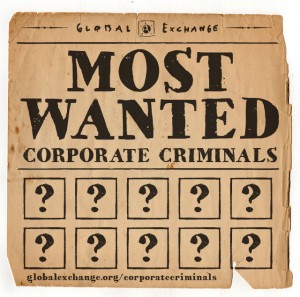
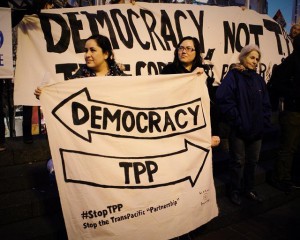

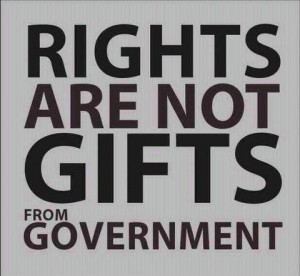
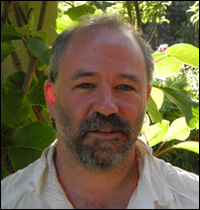

 Pittsburg => Martinez => Benicia => Rodeo => Richmond.
Pittsburg => Martinez => Benicia => Rodeo => Richmond.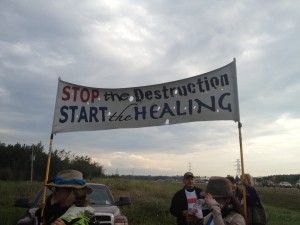

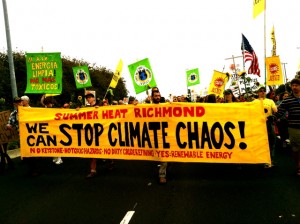

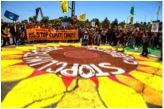


 As the temperature rises, so do we.
As the temperature rises, so do we.
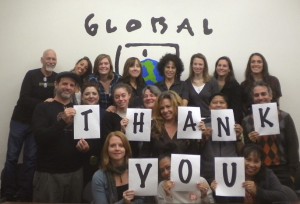 “Not everything that is faced can be changed, but nothing can be changed until it is faced.” ~James Baldwin
“Not everything that is faced can be changed, but nothing can be changed until it is faced.” ~James Baldwin